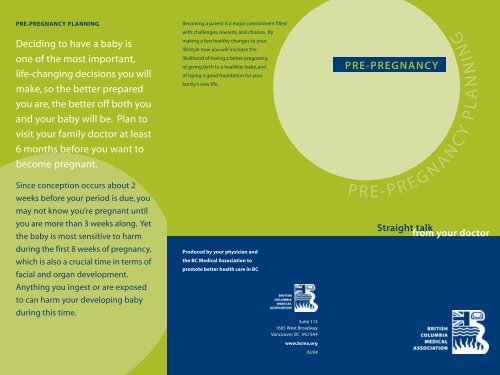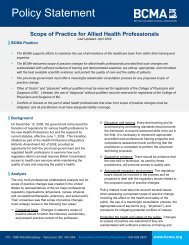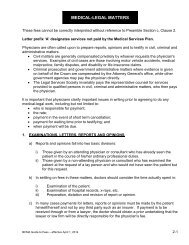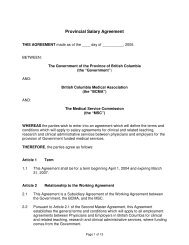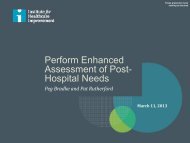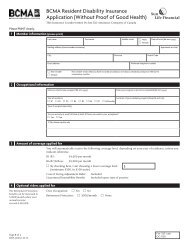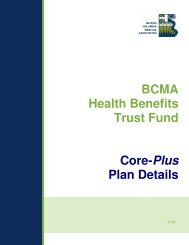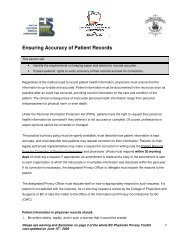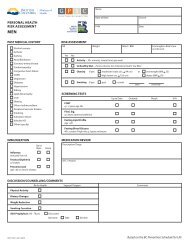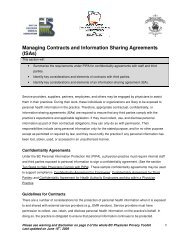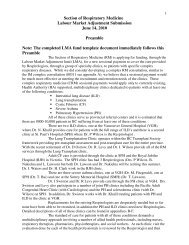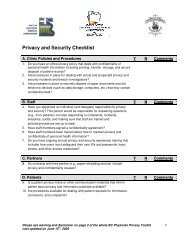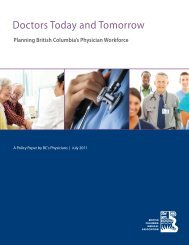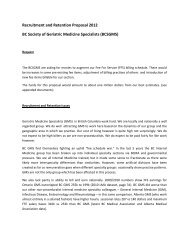Pre Pregnancy Brochure
Pre Pregnancy Brochure
Pre Pregnancy Brochure
You also want an ePaper? Increase the reach of your titles
YUMPU automatically turns print PDFs into web optimized ePapers that Google loves.
PRE-PREGNANCY PLANNING<br />
Deciding to have a baby is<br />
one of the most important,<br />
life-changing decisions you will<br />
make, so the better prepared<br />
you are, the better off both you<br />
and your baby will be. Plan to<br />
visit your family doctor at least<br />
6 months before you want to<br />
become pregnant.<br />
Since conception occurs about 2<br />
weeks before your period is due, you<br />
may not know you’re pregnant until<br />
you are more than 3 weeks along. Yet<br />
the baby is most sensitive to harm<br />
during the first 8 weeks of pregnancy,<br />
which is also a crucial time in terms of<br />
facial and organ development.<br />
Anything you ingest or are exposed<br />
to can harm your developing baby<br />
during this time.<br />
Becoming a parent is a major commitment filled<br />
with challenges, rewards, and choices. By<br />
making a few healthy changes to your<br />
lifestyle now you will increase the<br />
likelihood of having a better pregnancy,<br />
of giving birth to a healthier baby, and<br />
of laying a good foundation for your<br />
family’s new life.<br />
Produced by your physician and<br />
the BC Medical Association to<br />
promote better health care in BC<br />
Suite 115<br />
1665 West Broadway<br />
Vancouver, BC V6J 5A4<br />
www.bcma.org<br />
03/04<br />
PRE-PREGNANCY<br />
I N G<br />
P L A N N<br />
P R E - P R E G N A N C Y<br />
Straight talk<br />
from your doctor
THE INITIAL VISIT TO YOUR DOCTOR<br />
During this initial visit your doctor will likely give you<br />
a complete physical. You and the father to be will<br />
probably be asked about your medical history. You<br />
may need some tests to see if you have any health<br />
issues that may harm your baby or you during<br />
pregnancy. Many treatments exist today that are<br />
designed to protect the two of you.<br />
Rubella, or German measles, can be extremely harmful<br />
to your baby if you contract it while pregnant. A blood<br />
test before pregnancy will determine whether you are<br />
at risk for contracting this disease. If you’ve never had<br />
rubella, an immunization can be given to you before you<br />
get pregnant.<br />
Sexually transmitted diseases (STDs) such as<br />
gonorrhea, syphilis, and chlamydia can make it hard for<br />
you to get pregnant, and can also harm your baby during<br />
pregnancy or delivery. You should be screened and<br />
tested for these and other infections before pregnancy.<br />
HIV, human immunodeficiency virus, the virus that<br />
causes AIDS (acquired immunodeficiency syndrome),<br />
can be passed onto your baby. It is important to know<br />
ahead of time if you are HIV-positive in order to make<br />
the best decisions.<br />
Your doctor may also perform other tests depending on<br />
whether you are at risk for certain health concerns such<br />
as anemia or hepatitis, or have health problems such as<br />
diabetes, high blood pressure, or epilepsy. It’s usually<br />
safer and easier to treat these types of problems or get<br />
them under control before you’re pregnant rather than<br />
during your pregnancy.<br />
There are genetic diseases that run in families that<br />
THINGS YOU CAN DO NOW TO PREPARE<br />
could potentially put your baby at risk. Cystic<br />
FOR A HEALTHY PREGNANCY<br />
fibrosis and sickle cell anemia are examples.<br />
These are not caused by anything you have<br />
Women who have enough folic acid in their bodies before pregnancy can greatly<br />
or have not done. There are also other<br />
decrease the risk of having a baby with serious brain or spinal cord defects. Folic acid,<br />
genetic problems that could occur if<br />
a B vitamin, should be taken in a dose of 1 mg daily for 3 months before conception<br />
you are over the age of 35. Talk with<br />
because these problems develop very early in pregnancy – only 3 to 4 weeks after conception.<br />
your doctor about any risk factors.<br />
Found in green leafy vegetables (like spinach), broccoli, cauliflower, brussel sprouts, fruits such<br />
Thalassemia is a blood condition<br />
as oranges, cantaloupe, and bananas, milk, grains and organ meats, folic acid should be taken<br />
common in people of<br />
throughout the entire pregnancy. <strong>Pre</strong>gnancy vitamins ensure that you get the recommended<br />
Mediterranean descent. If you<br />
dose of 1 mg per day. If you choose a multivitamin instead, ensure that it contains at least 1 mg<br />
have a Mediterranean<br />
of folic acid, as many multivitamins do not.<br />
background you should be<br />
screened for this condition<br />
If you are overweight, your risk during pregnancy for problems such as high blood pressure and<br />
prior to pregnancy.<br />
diabetes increases. Therefore, you could use the time before becoming pregnant to lose some weight<br />
through exercise and diet changes. Talk with your doctor about the best program for you, as fad<br />
You need to tell your doctor diets and rapid weight loss are not good for your body prior to pregnancy.<br />
about any medications,<br />
either prescribed or<br />
Smoking, alcohol, and drug use can all adversely affect the development of your baby. These have<br />
purchased over the counter,<br />
been linked to miscarriage, premature birth and low birth weight, sudden infant death syndrome<br />
that you are currently taking<br />
(SIDS), fetal alcohol syndrome (FAS) – which causes mental slowness, poor growth, and facial defects<br />
since some of these can be<br />
– or your baby could be born addicted to drugs. For the healthy development of your baby, and<br />
harmful to your baby.<br />
the health of your own body, it is best to stop these habits for several months before becoming<br />
pregnant. Your doctor can provide the right treatment for you if you have trouble stopping<br />
on your own.<br />
You will be advised to keep a record<br />
of your menstrual periods as this<br />
If you are thinking of becoming pregnant, make sure that you book any x-rays during<br />
information is very important to the<br />
the first half of your menstrual cycles and avoid booking them during the second<br />
timing of certain medical procedures,<br />
half when you may be pregnant. The radiation could be harmful to your<br />
such as ultrasounds and amniocentesis,<br />
developing baby.<br />
after you become pregnant.<br />
Victims of domestic violence before pregnancy are often victims during<br />
pregnancy. If you are being abused, tell your doctor.


